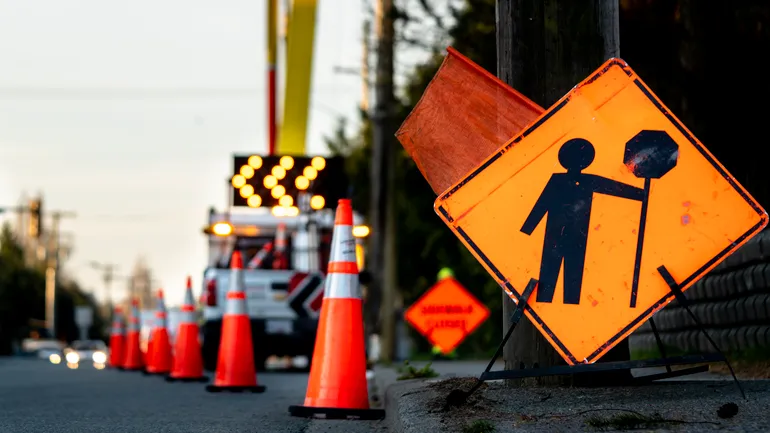Dive Brief:
- Two drivers traveling at high speeds most likely caused the March 2023 crash on I-695 near Baltimore that killed six construction workers, according to a report from the National Transportation Safety Board released earlier this month.
- The motorists were traveling around 120 mph when they collided, sending one car into a highway work zone, where it struck and killed six workers. The report listed the excessive speed of the two vehicles and unsafe lane changes by one driver as the probable causes of the crash.
- Though one of the cars passed through an opening in the work zone’s concrete barriers, the report found that the road builder, Gaithersburg, Maryland-based Concrete General Inc., had conducted daily safety assessments and found no significant issues in the days before the crash.
Dive Insight:
The tight work zone on the left shoulder of the highway required coordination of work areas, the report found, and workers were laboring in their assigned areas at the time of the crash.
In addition to the daily safety assessments, the report said:
- Foremen had daily, pre-work briefing with crews.
- The project superintendent inspected the site daily and held regular meetings with the Maryland State Highway Administration project engineer to discuss work activities.
- The contractor and MDSHA staff conducted daily maintenance of traffic inspections.
- MDSHA district office quality assurance inspectors visited the site on a weekly basis.
The NTSB report also noted the lack of one “Shoulder Closed” sign and one “Trucks Entering Highway” sign. The contractor claimed a vehicle had knocked down “Shoulder Closed” sign and it was scheduled to be replaced. Crews put up portable signs to indicate when trucks would come and go, as opposed to one permanent sign.
Additionally, a truck-mounted attenuator protection vehicle was parked behind the barrier opening, not blocking it. MDSHA and the contractor said the vehicle was used when the project needed lane closures, per the report, released Oct. 9. NTSB said the truck was used in a manner consistent with guidelines.
Finally, no speed cameras were present near the jobsite at the time of the collapse. Maryland law permits the use of automated speed cameras in work zones. MDSHA uses a number of factors to determine the placement of cameras, and, prior to the crash, the work zone had not been identified as having speeding prevalence.
The NTSB has recommended states and local authorities adopt the use of automated speed enforcement cameras in work zones to improve safety. After the crash, Maryland updated its laws to include higher fines and to permit cameras without human operators in work zones. MDSHA also implemented changes to work zone procedures such as more lane closures, protection vehicles and variable speed zones when workers are present.
Court cases
On Oct. 10, the family of Sybil DiMaggio, one of the workers who died, filed suit against Concrete General, the state of Maryland and the two motorists. The lawsuit alleges that the contractor failed “to ensure a safe construction zone for those working on the project,” the Baltimore Banner reported.
It claims that the toppled “Shoulder Closed” sign was not reinstalled and the truck was parked in a spot that didn’t protect workers from the 120-foot opening between barriers.
Nonetheless, NTSB’s report indicates those factors weren’t abnormal.
Concrete General did not respond to Construction Dive’s request for comment at the time of the suit, and MDSHA said in a statement shared with The Baltimore Sun that signs would not have prevented the crash — a claim seemingly supported by the NTSB’s findings.
As for the drivers, Melachi Brown pleaded guilty to six counts of negligent vehicular manslaughter and was sentenced to 18 months in prison. The trial of Lisa Lea, whose vehicle entered the workzone, is scheduled for April 2025.
Lea’s lawyer did not respond to Construction Dive’s request for comment on the suit and Brown’s lawyer could not be reached for comment at the time of the family’s suit.
DiMaggio, an employee of Sparks, Maryland, consulting and construction firm KCI Technologies Inc., was working on material testing on the jobsite when she was killed.
